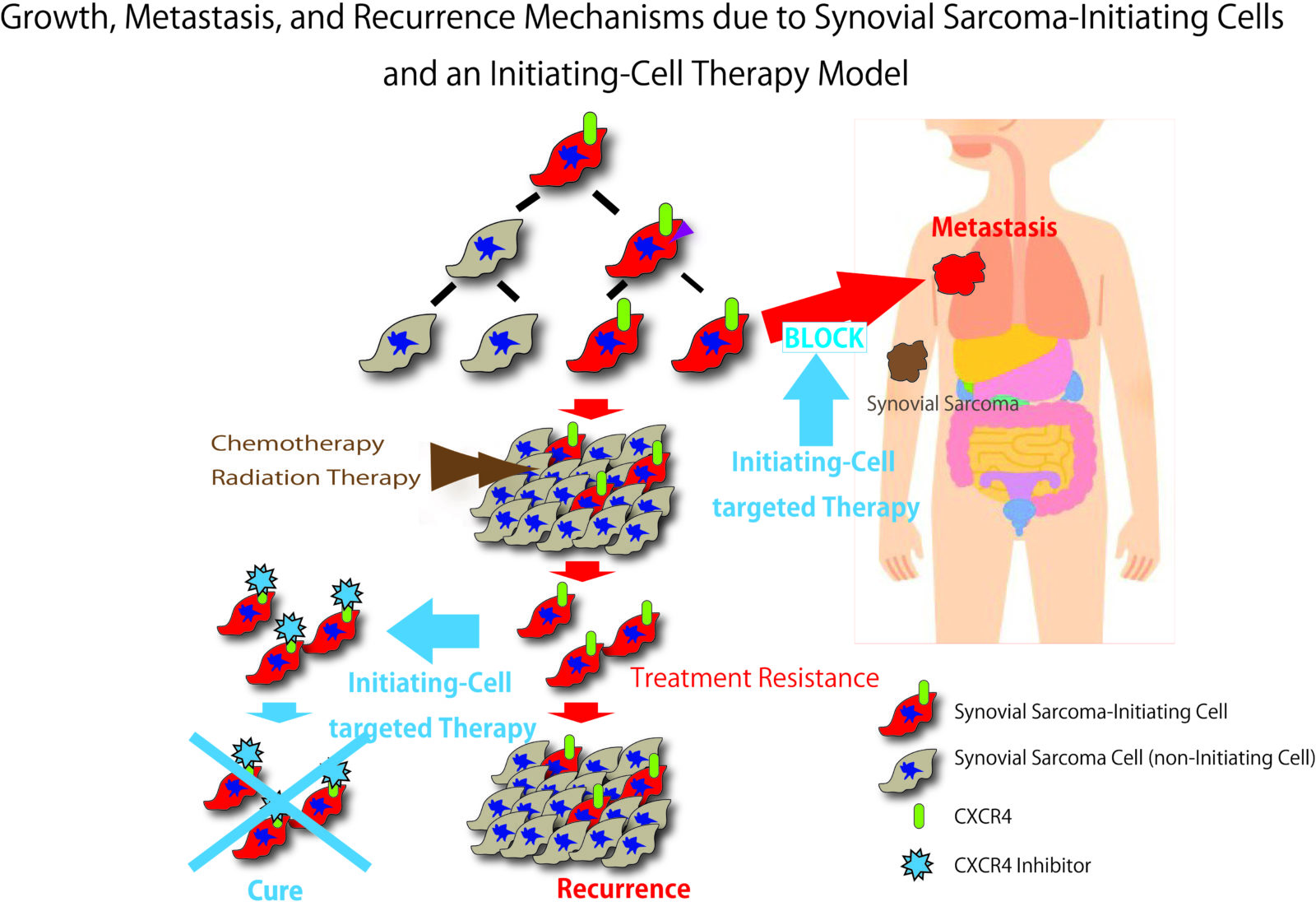First Successful Identification of Tumor-Initiating Cells for Synovial Sarcoma
Research Press Release | December 28, 2015

| Press Release | ||
|---|---|---|
| Key Points |
・Discovery that highly malignant tumor-initiating cells1 exist within synovial sarcomas. ・Discovery that the chemokine 2 receptor CXCR4 3 is a synovial sarcoma-initiating cell marker. ・Discovery that the survival period in cases of CXCR4-positive synovial sarcoma is clearly shorter than in cases that are negative. ・Indication of the possibility for tumor-initiating cell therapy, a new therapy for synovial sarcoma. |
|
|
Outline |
Synovial sarcoma is a malignant tumor that often occurs in the joints of the arms and legs of young adults. Although it can be surgically removed there is no effective therapy if it recurs or metastasizes, so the development of new therapies is desired. It is believed that in various malignant tumors there are tumor-initiating cells that are small in number but have high tumorigenic capacity, chemoresistance, and radiation resistance, and these initiating cells play a key role in the progression, recurrence, and metastasis of tumors. We have now clarified that a tumor-initiating cell component also exists in synovial sarcoma (synovial sarcoma-initiating cells), and that the chemokine receptor CXCR4 is a marker for the synovial sarcoma-initiating cells. In addition, we have found that the survival period in cases of synovial sarcoma that are CXCR4-positive is clearly shorter than in cases that are negative. From these research results we believe there is a possibility that suppressing the action of CXCR4 in synovial sarcoma-initiating cells can be applied to initiating-cell target therapies that prevent tumor development, recurrence, and metastasis. This research was mainly performed by Specially Appointed Assistant Professor Taichi Kimura, in the research laboratory of the Hokkaido University Graduate School of Medicine, Department of Cancer Pathology (Professor Shinya Tanaka), and has been published in Oncogene. |
|
|
Terms |
1 Tumor-Initiating Cells: These are defined to be cells that exist in small numbers within various malignant tumors, including cancer, and have the ability for self-renewal and multipotent differentiation. They have characteristics such as a high tumorigenic capacity, chemoresistance, and radiation resistance, when compared to non-tumor-initiating cells in the same tumor, so it is believed that these tumor-initiating cells play a major role in tumor growth, development, metastasis, and recurrence. 2 Chemokine: Proteins that act upon certain leukocytes and cause the leukocytes to migrate in the direction of the concentration gradient of the substance are called chemokines. Large numbers of chemokines are formed in sites of inflammation, causing leukocytes to migrate out of blood vessels and into the inflamed tissue. More than fifty chemokines have been identified so far. 3 CXCR4: This is an abbreviation for the C-X-C chemokine receptor-4, one of the proteins on the surface of CD4-positive T-cells. CXCR4 is a receptor for the chemokine named SDF-1, which is created by the supporting cells between cells. CXCR4 exists on the surfaces of tumor cells of various malignant tumors, and in particular is known to contribute to the metastasis of tumors such as breast cancer. |
|
| Inquiries |
Shinya TANAKA, Professor, Department of Cancer Pathology, Graduate School of Medicine, Hokkaido University. Phone: +81-11-706-5052 FAX: +81-11-706-5902 E-mail: tanaka[at]med.hokudai.ac.jp |
|
|
Japanese Link |
滑膜肉腫のがん幹細胞の同定にはじめて成功 (12.8.2015) | |
| Publications | Identification and analysis of CXCR4-positive synovial sarcoma-initiating cells, Oncogene (12.7.2015) | |
